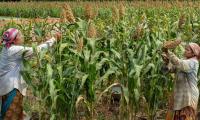Syngenta CEO Calls for Faster Regulatory Approvals in India
Syngenta CEO Jeff Rowe urges India to expedite regulatory approvals for innovative agricultural products, highlighting the need for faster solutions to address climate change and food security concerns.

New Delhi, Sep 4 (PTI) Switzerland-based Syngenta Group CEO Jeff Rowe has expressed concern over "bureaucratic delays" in regulatory approvals of innovative products in India's agricultural sector and urged the government to expedite the process for the benefit of farmers.
Amid growing challenges of impact of climate change on agriculture, Rowe emphasised on the need to ensure availability of innovative solutions to farmers at a faster pace to mitigate the risks.
In an exclusive interview to PTI, Rowe on his maiden visit to India in his current role, outlined Syngenta's strategies for the Indian market, emphasizing innovation to address climate change and food security concerns.
"Indian policy related to product approval takes a lot of time. It is very bureaucratic and there is an impact on farmers," Rowe said when asked about ease of doing business in India.
He added that the longer farmers wait to access innovation, particularly to handle climate change risks, the greater the risk they face.
Rowe praised the Indian government's push for consumer digitisation and expressed hope for "a similar push to modernize regulatory approvals for our industry because it will give much-needed solutions to farmers faster."
Highlighting Syngenta's role in the government's thrust to professionalise the farm sector, Rowe said the company views climate change as both a risk and an opportunity.
The global agrochemical firm is investing heavily in digital technology and crop modelling to help farmers adapt to changing climate conditions.
Syngenta, a leading player in India's vegetable seed business, is extensively using gene-editing tools to identify new diseases and provide solutions. The company releases new varieties annually, with Rowe stating, "The best is yet to come".
On addressing competition from generic players and price sensitivity in the Indian crop protection market, Rowe said, "We have to look at our portfolio in two segments. We have a segment which is more commoditised, and there's always pricing pressure. In the innovative product space, we price for value and farmers have a choice to use the best."
While acknowledging that profit margins are under pressure, Rowe advised farmers to make "smart investments," stating that higher input costs could lead to less chemical usage and higher yields.
The company plans to launch about 40 new crop protection products in the next 2-3 years.
While not disclosing India-specific figures, Rowe mentioned that Syngenta invests about USD 2 billion annually in R&D globally. "We believe we are the largest investor in R&D in the crop protection space in the world," he asserted.
Regarding the company's performance outlook, Rowe predicted a slight improvement in India's operation in the second half of 2024 but cautioned against expectations of a "dramatic recovery".
Commenting on the industry competition particularly with Bayer, Rowe said the company strongly believes in the value of competition.
"We look for opportunities to innovate in-house. We also look for opportunities to innovate with our competitors. If we have opportunities to collaborate with Bayer, Corteva, whomsoever, we welcome that opportunity. But when it comes to competition in the market price, we compete vigorously," he noted.
On organic farming, Rowe expressed concerns about large-scale adoption, citing efficiency concerns amidst increasing global food demand. "We know that organic farming is generally 20-30 per cent less efficient than conventional farming. At a time when the world needs more food, I think it's risky if we try to expand beyond a niche market," he said.
Rowe highlighted the importance of digital technology in addressing India's unique agricultural challenges, particularly in disseminating information to small-holding farmers.
Rowe's farm background, he believes, gives him a unique perspective in leading Syngenta. "I can think very much like a farmer thinks," he said, emphasizing the importance of maintaining farmers' trust and thinking long-term in decision-making.
As Syngenta navigates the complex Indian agricultural landscape, Rowe's vision appears focused on driving innovation, adapting to climate change, and balancing farmers' needs with market realities.
Amid growing challenges of impact of climate change on agriculture, Rowe emphasised on the need to ensure availability of innovative solutions to farmers at a faster pace to mitigate the risks.
In an exclusive interview to PTI, Rowe on his maiden visit to India in his current role, outlined Syngenta's strategies for the Indian market, emphasizing innovation to address climate change and food security concerns.
"Indian policy related to product approval takes a lot of time. It is very bureaucratic and there is an impact on farmers," Rowe said when asked about ease of doing business in India.
He added that the longer farmers wait to access innovation, particularly to handle climate change risks, the greater the risk they face.
Rowe praised the Indian government's push for consumer digitisation and expressed hope for "a similar push to modernize regulatory approvals for our industry because it will give much-needed solutions to farmers faster."
Highlighting Syngenta's role in the government's thrust to professionalise the farm sector, Rowe said the company views climate change as both a risk and an opportunity.
The global agrochemical firm is investing heavily in digital technology and crop modelling to help farmers adapt to changing climate conditions.
Syngenta, a leading player in India's vegetable seed business, is extensively using gene-editing tools to identify new diseases and provide solutions. The company releases new varieties annually, with Rowe stating, "The best is yet to come".
On addressing competition from generic players and price sensitivity in the Indian crop protection market, Rowe said, "We have to look at our portfolio in two segments. We have a segment which is more commoditised, and there's always pricing pressure. In the innovative product space, we price for value and farmers have a choice to use the best."
While acknowledging that profit margins are under pressure, Rowe advised farmers to make "smart investments," stating that higher input costs could lead to less chemical usage and higher yields.
The company plans to launch about 40 new crop protection products in the next 2-3 years.
While not disclosing India-specific figures, Rowe mentioned that Syngenta invests about USD 2 billion annually in R&D globally. "We believe we are the largest investor in R&D in the crop protection space in the world," he asserted.
Regarding the company's performance outlook, Rowe predicted a slight improvement in India's operation in the second half of 2024 but cautioned against expectations of a "dramatic recovery".
Commenting on the industry competition particularly with Bayer, Rowe said the company strongly believes in the value of competition.
"We look for opportunities to innovate in-house. We also look for opportunities to innovate with our competitors. If we have opportunities to collaborate with Bayer, Corteva, whomsoever, we welcome that opportunity. But when it comes to competition in the market price, we compete vigorously," he noted.
On organic farming, Rowe expressed concerns about large-scale adoption, citing efficiency concerns amidst increasing global food demand. "We know that organic farming is generally 20-30 per cent less efficient than conventional farming. At a time when the world needs more food, I think it's risky if we try to expand beyond a niche market," he said.
Rowe highlighted the importance of digital technology in addressing India's unique agricultural challenges, particularly in disseminating information to small-holding farmers.
Rowe's farm background, he believes, gives him a unique perspective in leading Syngenta. "I can think very much like a farmer thinks," he said, emphasizing the importance of maintaining farmers' trust and thinking long-term in decision-making.
As Syngenta navigates the complex Indian agricultural landscape, Rowe's vision appears focused on driving innovation, adapting to climate change, and balancing farmers' needs with market realities.
You May Like To Read
TODAY'S MOST TRADED COMPANIES
- Company Name
- Price
- Volume
- Vodafone-Idea-L
- 11.65 (+ 3.56)
- 106772451
- Alstone-Textiles
- 0.28 ( -3.45)
- 44187760
- Mangalam-Industrial
- 0.88 ( -2.22)
- 39177573
- Sunshine-Capital
- 0.27 (+ 3.85)
- 35956340
- GMR-Airports
- 104.40 (+ 6.37)
- 30453005





